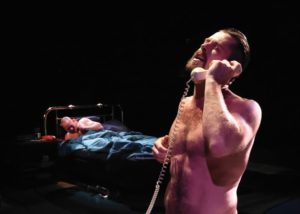If you didn’t live through it, it’s difficult to imagine the extreme sense of urgency and doom that the gay community experienced in the early ’80s, when AIDS hit. The ’70s, following Stonewall in 1969, were a heady time for queer people, who finally realized the possibility of freely expressing their sexuality and love. An ever-expanding bacchanalia ensued, particularly for gay men, among whom anonymous and multiple hookups were not uncommon. (Even harder to imagine: they accomplished this without cell phones or apps.)

HIV, which was eventually identified as the cause of AIDS, struck at the heart of this sexual minority’s identity and freedom — a minority that was well aware of what it was like to feel shame and fear over the mere fact of who one is attracted to. The appearance of any symptoms of AIDS in the early ’80s was a death sentence, and the practices of “safe sex” took years to evolve. The protease inhibitor cocktail that tamed the virus was not discovered until 1995. By then, millions worldwide had succumbed.
Some of the theatrical works that arose from that era were essentially shrieks of desperation. Larry Kramer’s The Normal Heart, which opened at the Public Theater in New York City in 1985 and tracks the birth of Gay Men’s Health Crisis, is an example. Watching it today doesn’t have the same force as it did for those who saw it then, while their friends were dying. In 1986, Robert Chesley’s Jerker opened first in Los Angeles, then off-Broadway in New York in 1987. It’s a 90-minute one-act play composed of a series of phone calls and scenes of phone sex between two gay men in separate apartments in San Francisco’s Castro district, where the play is set. Despite this risk-free activity, things don’t end well. But that reflects the sincere mindset of the times. Chesley himself died of AIDS in 1990.
Even though it was written and set in 1985, Jerker is having its New England premiere at the Provincetown Theater this season. Its absence till now is not surprising: the play is intimidating, with ample full-frontal nudity and explicit gay sex talk — including some kinky practices, from S&M role-playing to water sports — and it experienced censorship hurdles when the FCC went after a California radio station for reading passages on the air.
The logistics of gay sex are certainly the crux of Jerker, but it has a far deeper resonance. It gets to the core of why sexual expression is an essential part of human intimacy and what happens when that is threatened. And though the contemporary context is different — AIDS is neither an untreatable disease nor a generalized stigma for the LGBTQ population today — the Provincetown production retains its emotional power. Many will be moved to tears — one of the meanings of the play’s title.
That’s because it’s sensitively and thoughtfully conceived and executed, as directed by the company’s David Drake and performed by Joe MacDougall, who plays the crippled Vietnam vet J.R., and Stephen Walker, who plays Bert, the younger object of J.R.’s passion.
The connection between them is more or less anonymous, though they have previously and briefly encountered each other in person. J.R. initiates the phone sex and ends up revealing his most private self: his physical nakedness is metaphorically necessary. MacDougall gives J.R. a fitting gruffness and plays his climactic moment — a romantic, childlike fantasy that lifts the drama far beyond sex — with utter humility and grace. Walker’s Bert is also lovingly fleshed out; his English accent is distracting at first, but eventually finds itself within the multi-culti gay mecca that was the Castro in the mid-80s.
Because the stage is mostly dark and spotlighted, the spare theater-in-the-round production design by Ellen Rousseau and lighting by Stephen Petrilli are not as spectacular as they usually are at the Provincetown Theater, but they serve the drama well. In the overall darkness, Drake keeps things moving with careful reveals. The effect is hypnotic: as time-specific as this Jerker is, it feels timeless.
Likewise, as forthright as the play’s subject matter is, its subtleties are many. There’s a subtext to the phone sex, and that is the power of storytelling in times of deprivation, something also explored in Manuel Puig’s Kiss of the Spider Woman. Stories and fantasies can join characters together when they are apart, offering affirmation in a world with little hope. That kind of boost is important, especially now, when intolerance is surging, and the right wing threatens civil rights. The Provincetown Theater’s Jerker emerges at a time when human connections are in tatters.
The Naked and the Dead
The event: Jerker, a play by Robert Chesley
The time: Through Sept. 1, Monday through Thursday (except Thursday, Aug. 18; Friday, Aug. 19 added), 7 p.m.
The place: Provincetown Theater, 238 Bradford St.
The cost: $40 at provincetowntheater.org or (508) 487-7487



